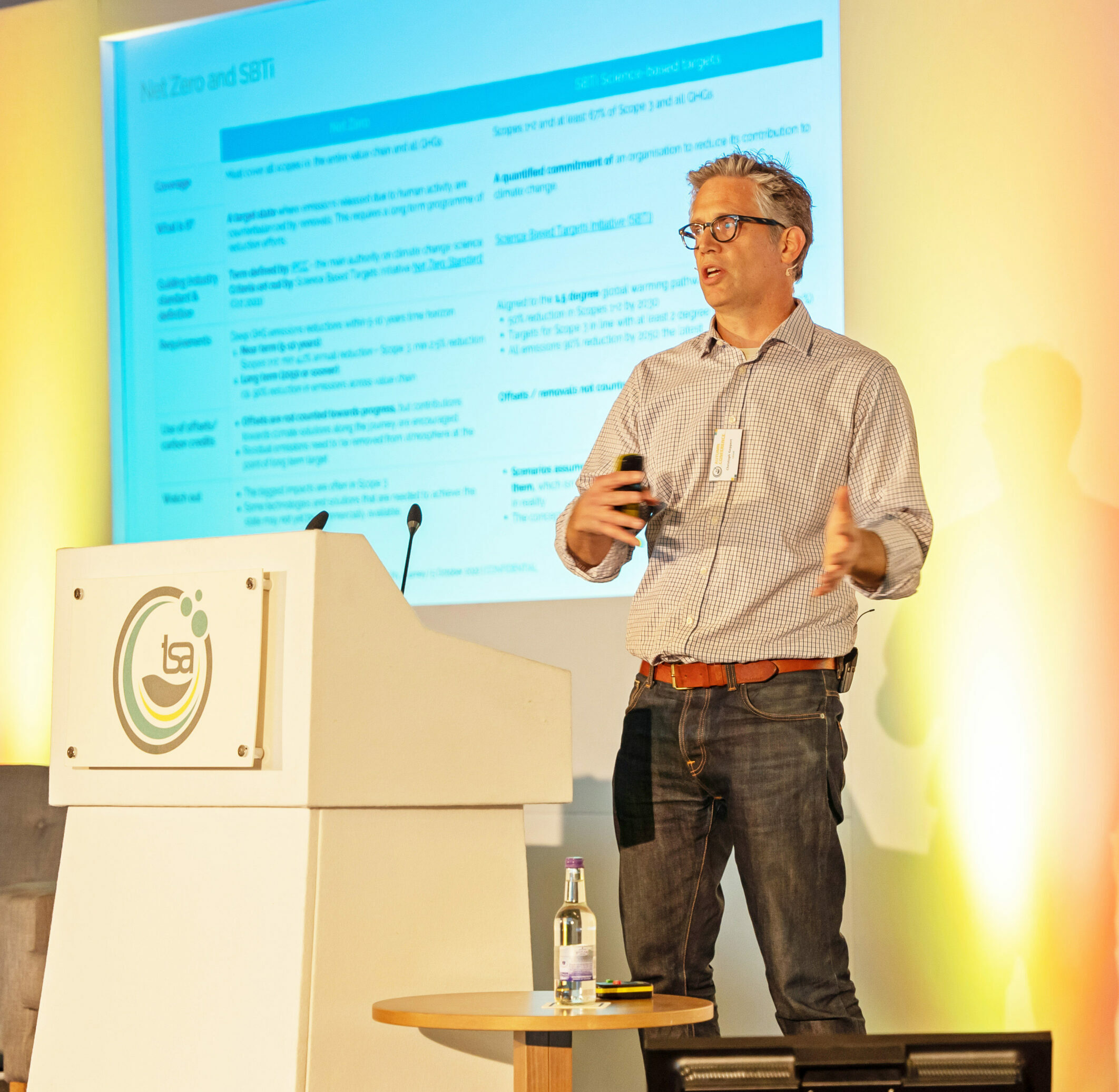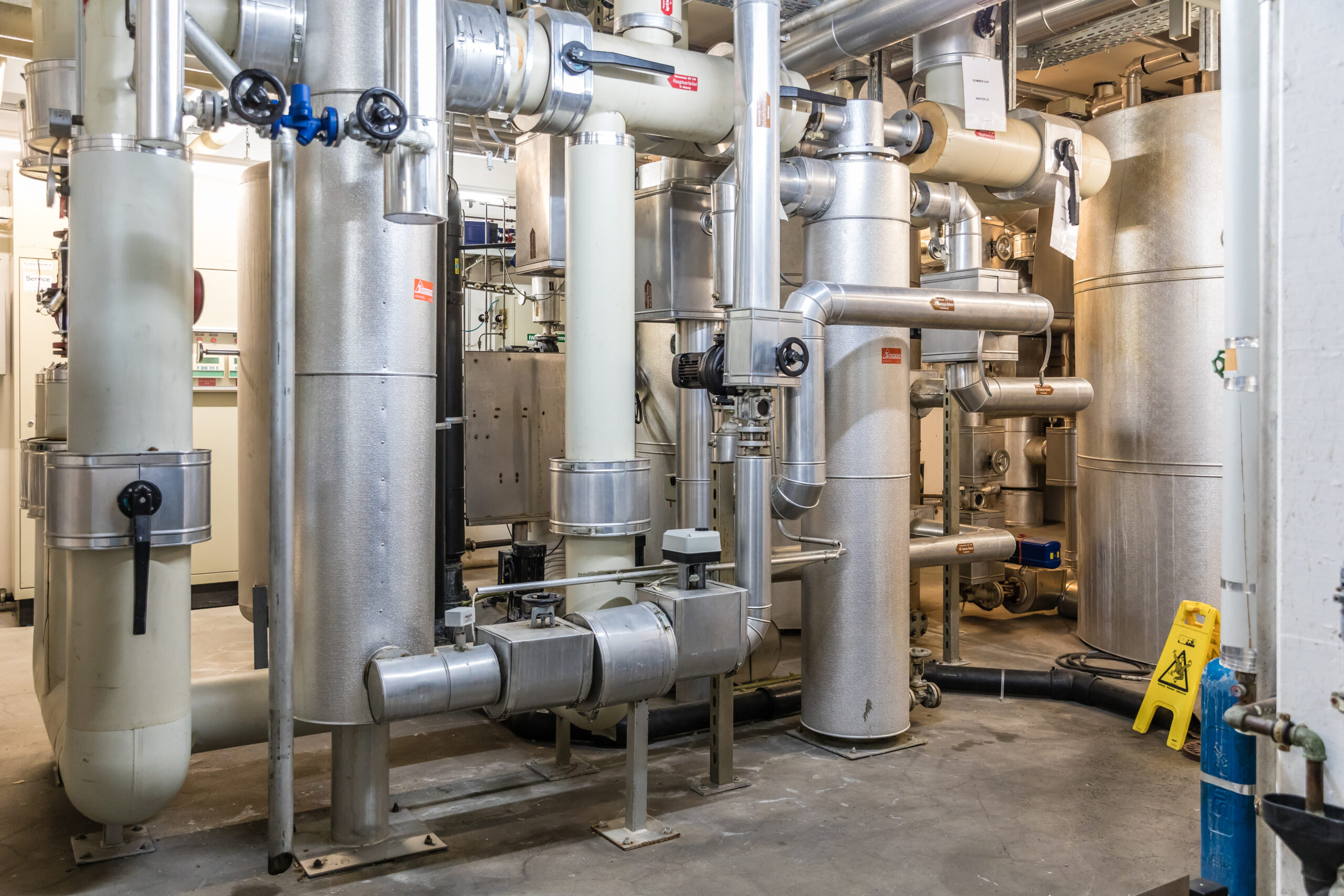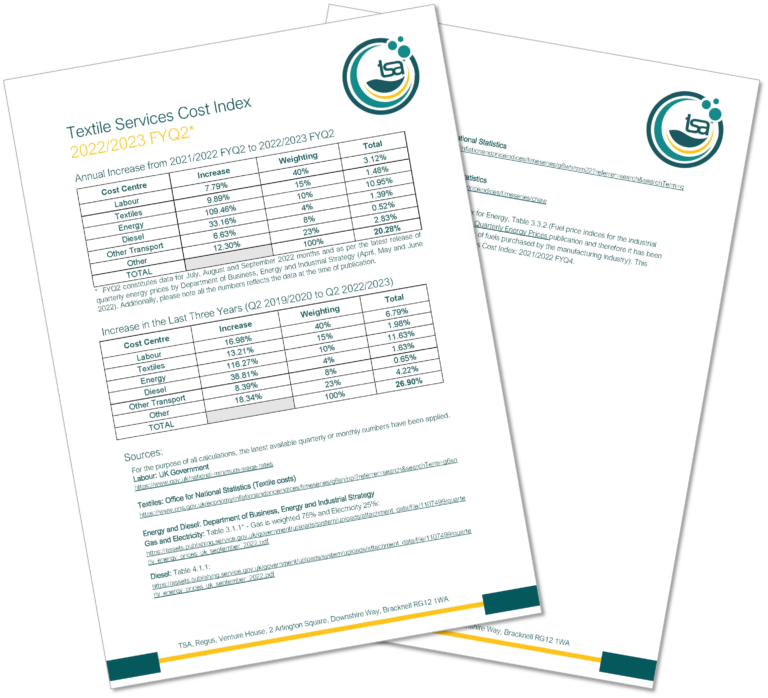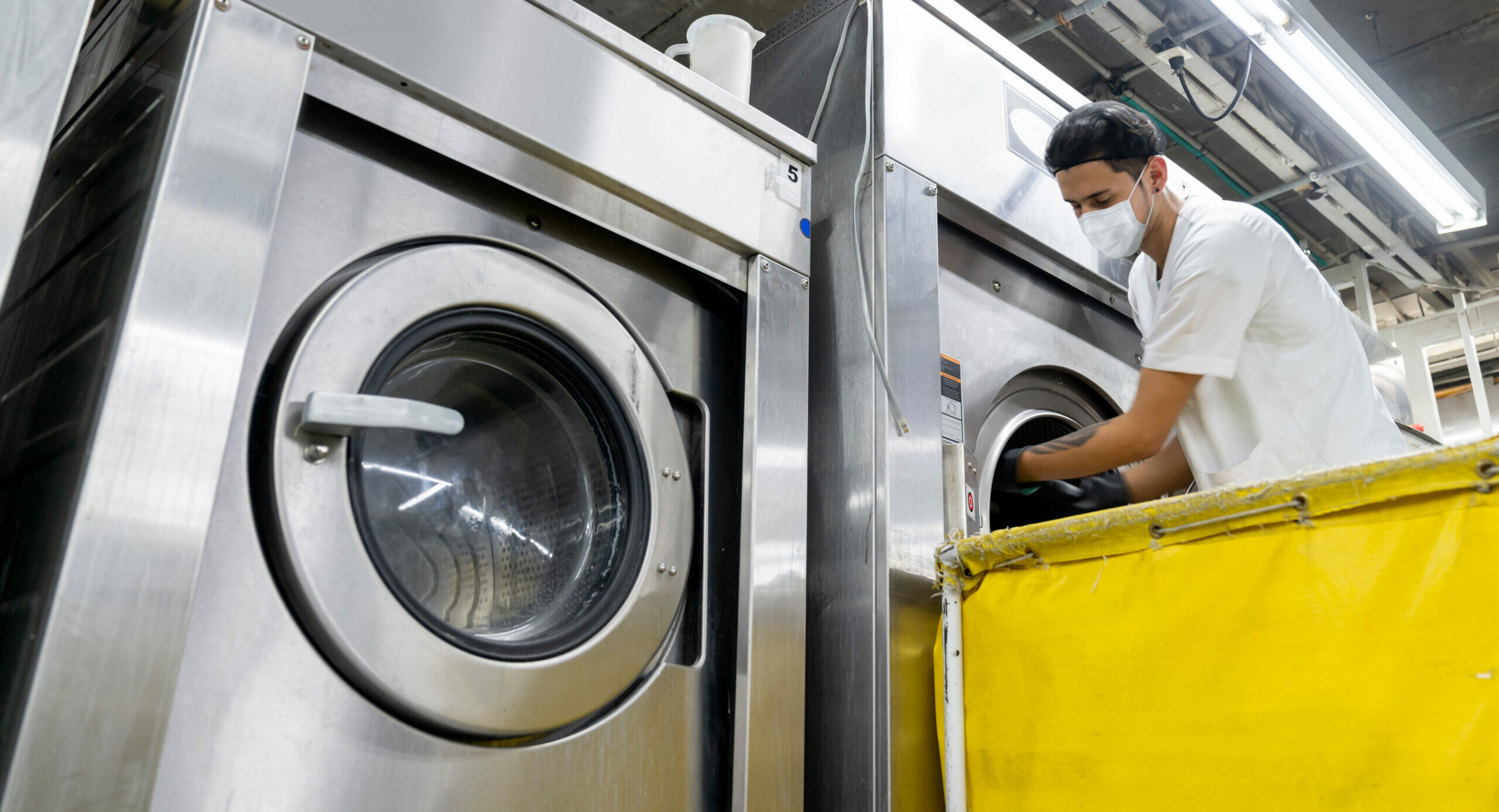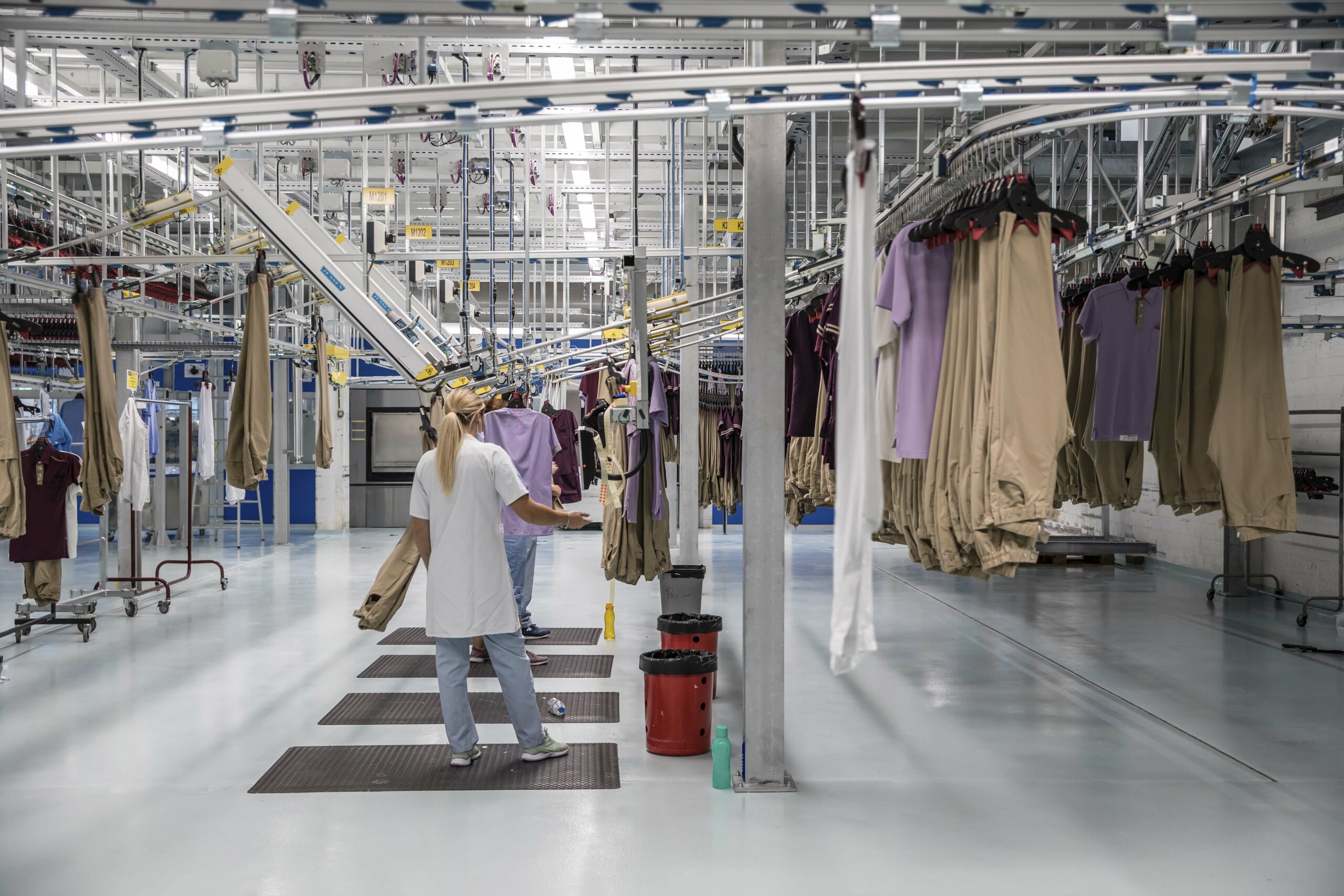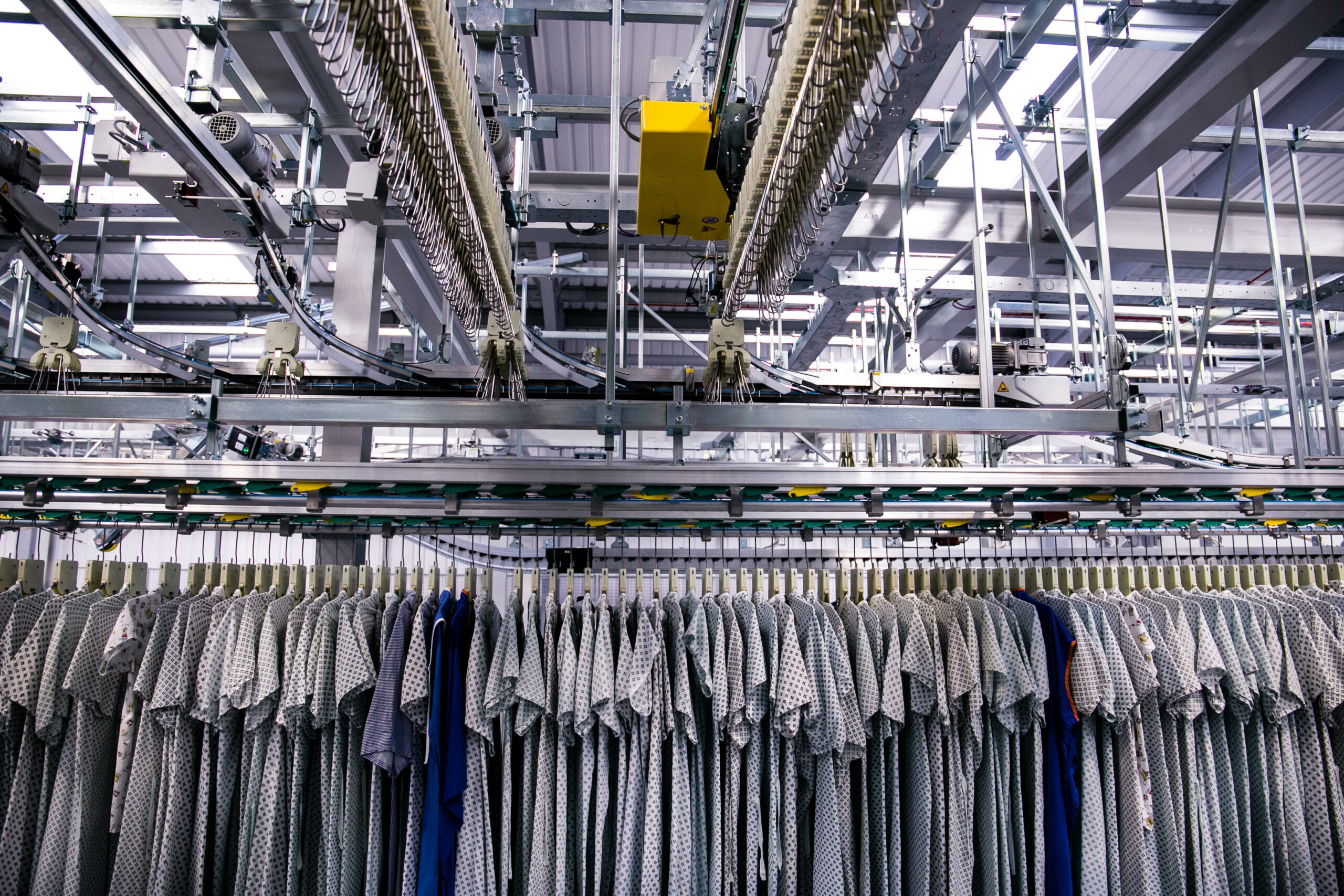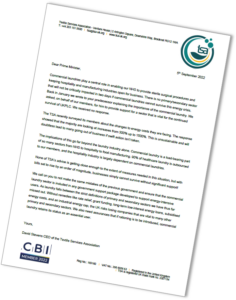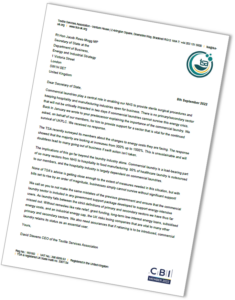Creating maps for a sustainable laundry industry
TSA Autumn conference hears latest updates on the progress of vital project
The Textile Services Association’s (TSA) autumn conference saw Christoph Geppert from Grain Sustainability give a presentation updating members on the progress of the TSA’s ongoing sustainability roadmap project.
Grain is a consultancy that is working with the TSA to establish higher standards for the laundry industry for sustainability to ensure it is ready to meet the coming challenges of implementing Net Zero Carbon targets.
In order to achieve this, Grain and the TSA are undertaking extensive research, interviewing stakeholders throughout the industry as well as scientists and suppliers. Christoph’s presentation examined some of the responses to the interviews, which give a snapshot of the state of the industry’s attitudes to sustainability and the concerns surrounding it.
Two of the biggest issues currently facing the industry are staffing shortages and the ongoing impacts of Brexit and the pandemic. Christoph summarised from the interviews, “We are still in recovery, sustainability can easily get put on the back burner unless we are intentional about it.” Without downplaying the difficulties the industry is currently facing, he confirmed the importance of looking for ways to improve long term sustainability whilst, at the same time, securing the survival of businesses, and how these aims can complement each other.
The importance of improving the working environment for staff was also examined, and Christoph stressed the importance of including factors like wellbeing, diversity and inclusion as part of any sustainability roadmap. “The work environment has to be a place where people want to be,” he said.
Christoph then outlined the next step in the process, which will be to gather accurate data on the extent of emissions produced by the textile services industry as well as throughout its supply chain. Customers have started to ask for this, so ensuring that the processes are in place to have these insights is very important.
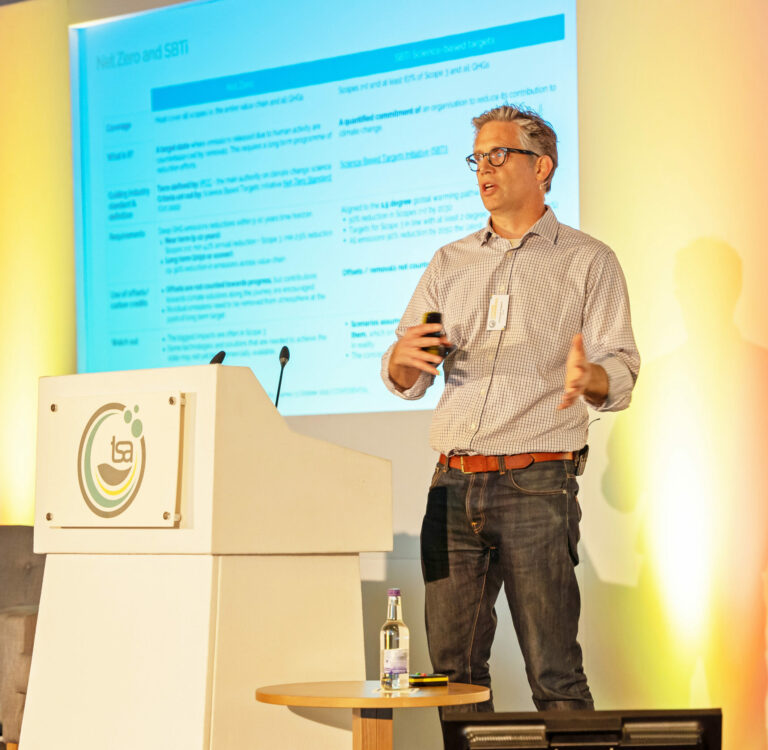
In order to help with this, the TSA and Grain are creating guides on how to record this data accurately. This will help to identify areas with the greatest potential to reduce emissions. Christoph pointed out that the laundry industry has some inherent advantages that allow it to be a leader in sustainability. “Progress is already being made,” he said. “Some laundries have stopped using single use plastics for linen, for example. This is just one of the ways that being an inherently circular industry can help, as it allows you to rethink processes all along the supply chain and find more efficient ways of doing things.”
Once the assessment stage is complete, Grain and the TSA will begin to develop an overarching strategy for creating goals, targets and KPIs to clearly structure the Net Zero implementation process.
Christoph was optimistic that the industry would be able to achieve its goals. “This is a big opportunity to help a range of industries, not just laundry but textiles as a whole, as well as hospitality and other sectors that rely on them. We will be able to pool knowledge and build a proactive strategy that will work to protect businesses and the environment for future generations.
“Much of the laundry industry is already making very positive moves to reduce its energy consumption and emissions,” he said. “The good news is that laundries simply need to do more of what they are already doing!”
If you have any queries, please do not hesitate to get in touch with us either via email or phone:
T +44 (0) 20 3151 5600
Laundry And Hospitality Industries Confident They Can Meet The Challenges Ahead
Laundry and hospitality industries restate the importance of collaboration at the TSA conference
The importance of collaboration was one of the main messages to come out of the hospitality round table panel discussion held at the Textile Services Association’s (TSA) autumn conference.
The event brought together representatives of some of the biggest names in both the laundry and hospitality sectors to discuss the issues facing both industries and the potential for positive change in an uncertain business environment. It is the third such event that has been held this year, which provides a forum for both industries to discuss the challenges ahead.
The panel was chaired by David Stevens, the CEO of the TSA, and featured Nigel Graham of Bourne Leisure, and Michael Simpson-Jones of Travelodge representing hospitality. Helen Wood of Johnsons Hotel Linen and Rona Tait of TDS Commercial were there to provide the views from the laundry industry.
One of the main concerns highlighted at the previous meetings was the need to improve the working life span of linen used by hotels. Only a small percentage of the 7000 tonnes of linen purchased every year by the hospitality sector reaches its potential end-of-life.
Since the previous round table, the TSA has set up a project group looking at creating guidance around best practice for linen and the logistics needed to maximise its working life for the hospitality industry. Nigel Graham who is a part of this group, explained the importance of the two industries working together to develop knowledge of the significance of valuing linen and understanding the challenges both industries face.
Rona Tait, who chairs the group, explained that many housekeepers don’t understand the importance of linen from a sustainability perspective, stressing the need for better training.
Helen Wood underlined the point that any approach to improving the sustainability of hotel linen needs to be done as a partnership. “You don’t hire a car and damage it without expecting to pay for it,” she said. “But we need to avoid playing the blame game and realise that we can’t solve this situation on our own – we need to work together.”
Michael believes that having a relationship where both sides feel confident about discussing common issues and being open to change is vital. “We need to make sure that both industries stick to their commitments and consider the supply chain as a whole.”

The last couple of years have seen both industries cope with challenging business environments, but while 2023 looks likely to see problems continue both industries are optimistic that they are well placed to weather the storm. “The UK’s holiday industry has historically held up well during economic downturns,” says Nigel. However, as people tend to book hotels close to when they need them, hotels need to be quick to react with demand forecasting to enable laundries to be able to keep up with the demand as it changes.
This is particularly true as there are potentially different variables at play with the rising cost pressures many consumers are facing and how that will play out next year. While Rona noted that she had seen volumes from hotels hold up, Helen noted that there was a difference across hotel groups and that this indicated that consumers were changing their behaviour.
The panel agreed that one of the main positives that came out of the pandemic was that it had acted as a “catalyst for change” and that it had provided the momentum for both industries to come together and work to improve things. “We wouldn’t have had these conversations before Covid,” Rona explained. “We are now seen as more of a critical supplier,” said Helen. “There is a different partnership now, it has definitely raised the bar.”
As Michael summed it up, “every challenge brings new opportunities.”
If you have any queries, please do not hesitate to get in touch with us either via email or phone:
T +44 (0) 20 3151 5600
How Hazardous Are Nurses’ Uniforms? DMU And TSA Call For Change In NHS Guidance
‘World class’ research shows domestic washing machines are inadequate decontaminators
Over 700,000 nurses in the UK wash their uniforms at home. The figure is even higher when you take into account other healthcare workers. The NHS encourages nurses to maintain and care for healthcare workwear at home, even where outsourcing to a commercial laundry is available. However, new research carried out be De Montfort University (DMU), supported by the Textile Services Association (TSA), suggests that this practice is hazardous, proving that some domestic machines are not up to the task of decontaminating clothes. Now DMU and TSA are calling on the NHS to change the guidance.
The research (Variable decontamination efficacy of domestic washing machines: potential risks for home laundering of healthcare uniforms) was carried out by DMU’s Infectious Disease Research Group, with funding from the TSA. It was presented at the Infection Prevention Society (IPS) Conference in October 2022.
The aim of the research was to assess the ability of home washing machines to meet the minimum disinfection standards set by the NHS in HTM 01-04 (Decontamination of linen for health and social care, updated 31/08/2021). Six different domestic models were used, of different ages and manufacturers, to ensure the ‘real world’ authenticity of the testing. In addition, DMU and TSA developed an accurate methodology that is able to validate the ability of a washing process to disinfect textile products – especially those used in healthcare, food manufacturing, pharmaceuticals and other sectors where there is a need for high-care textile maintenance.
The results confirmed the inadequacy of domestic washing machines to consistently achieve the essential requirements of heat, chemistry and mechanical action required for decontamination. NHS Guidelines recommend that healthcare workers launder their uniforms at 60C. In fact, in the tests, none of the machines actually got up to 60C, either on standard or rapid wash programmes. It shows that healthcare workers taking their uniforms home to wash cannot be confident, at the end of the wash, that their uniform has been fully disinfected. This leaves their households under risk of cross contamination from pathogens that they may bring home from work.
“The TSA has always argued that nurses’ uniforms should be washed professionally,” says David Stevens, CEO at the TSA. “PHE (Public Health England) and other departments have said there was not enough evidence to prove the inadequacy of domestic washing machines.
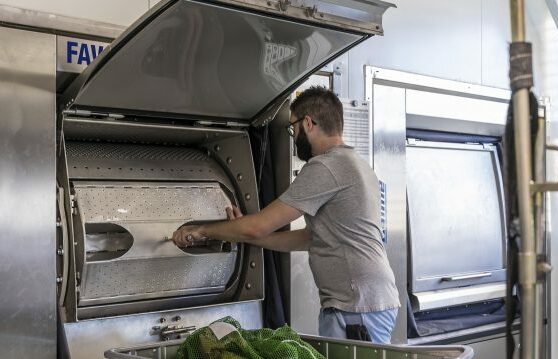
“Well, there is now. And it’s based on world-class research from some of the most respected names in the field of infectious diseases.”
TSA believes that the NHS will have to change its polices in the light of the research. “The need to change is even more pressing given the huge rise in energy prices,” says Stevens. “HMRC policies allow healthcare workers to be given allowances to launder unforms at home. But these no longer cover the costs, so they are out of pocket as well.”
Moreover, TSA believes the required shift in management practices will be good news for the NHS. “Washing in commercial laundries, whether on site or outsourced, will result not only in safer homes and workplaces, but also offer the NHS significant efficiencies and economies of scale,” says Stevens.
If you have any queries, please do not hesitate to get in touch with us either via email or phone:
T +44 (0) 20 3151 5600
TSA Urges Further Action From Government To Guarantee Future Of Laundry Industry
Long term plans are required to prevent vital industry missing out on essential support
The Textile Services Association (TSA) is highlighting the concerns of its members regarding the rise in energy prices and the potentially disastrous effects they could have on the UK’s hospitality industry over the coming year. These issues have been highlighted by the results of two surveys the TSA conducted on the views of its members in August and September 2022 and demonstrate the need for continued action on top of the six month emergency price cap for businesses announced in the emergency budget.
The first survey took place in August and was focussed on the post Covid recovery in business. The results showed signs of optimism but also indicated some ongoing issues. It indicated that 83% of commercial laundries have returned to or increased their pre-pandemic turnover, and 79% anticipated turnover to be on a similar trajectory in 2023. However, 79% reported issues with supply chains, in particular difficulties with equipment, spare parts and linen.
The second survey was taken in early September, before the energy price cap was announced. It aimed to take a snapshot of the concerns of the laundry regarding the increasing costs of energy. 85% of responding laundries service a range of essential and influential sectors, including healthcare, education, hospitality and critical manufacturing among others. The majority of respondents have already seen energy prices increasing anywhere from 200 to 500% since 2019, and many were anticipating further increases between 300-600% for 2023.
“While the government’s announcement of a six month price cap will undoubtedly help laundries throughout the winter months, the price increases that have already taken place are having a huge impact on many of them,” says David Stevens, CEO of TSA. “We feel that further steps are necessary to prevent real problems when the current scheme ends.”
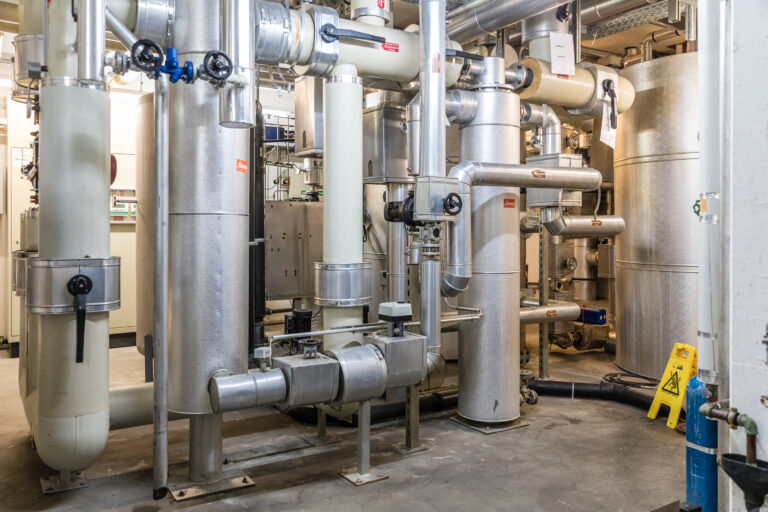
The laundry industry is vital to the UK’s hospitality sector but, as it is a hidden part of the supply chain, it has often been overlooked for government support during the crises of the last few years. “The government needs to take a big picture view of these situations,” says Stevens. “The laundry industry needs to be included as one of the sectors that receives further support once the six months is up. We cannot wait half a year to find out what is happening – we need a clear long term support strategy now, to allow us to plan for the future.”
“We are encouraged by the signs that MPs are increasingly aware of the importance of laundries to the UK economy as a whole,” says David. “We will continue to lobby on behalf of our members, and the whole commercial laundry industry, but we need to see hard evidence that the government has also understood the message”
If you have any queries, please do not hesitate to get in touch with us either via email or phone:
T +44 (0) 20 3151 5600
Laundry Cost Index: 2022/2023 FYQ2
Laundry Cost Index
Please see our latest published Laundry Cost Index for 2022/2023 FYQ2 below:
Please see the Previous Annual Increases below for comparison:
If you have any queries or would like any further information, please do not hesitate to get in touch with us.
T: +44 (0)20 3151 5600
E: tsa@tsa-uk.org
Care homes, laundering and infection control
TSA supports DMU in biggest ever study of its kind into care homes
The TSA is supporting De Montfort University (DMU) on a survey of care homes. The survey will give an insight into care homes’ attitudes and practices in terms of their laundry service. Care home staff and managers are being asked to take part in the new survey, which will reveal how infection control with regards to laundry is managed in care home environments.
The survey aims to help care homes, nursing homes and sheltered housing spaces across the UK identify knowledge gaps, recognise best practice and support them to set the standard in line with current and future requirements for care home laundry practices in the UK.
“We need to understand infection control in this sector so that we can support care homes and related establishments to achieve the highest possible standards,” says David Stevens, CEO of the TSA. “The DMU survey will give us the answers.”
The study is the biggest of its kind into the current knowledge, processes, attitudes and behaviours of care home staff for dealing with laundry from residents and living spaces, as well as their own work clothing.
Care homes, nursing homes and sheltered housing providers and staff are being asked to fill in the surveys. Professor Katie Laird, Professor of Microbiology at DMU, is leading on the study. She previously investigated how the coronavirus pandemic affected the way in which healthcare staff and nurses laundered their uniforms.
She says, “We are keen to discover the current infection control policies and practices that are used by care home staff.”
“At the moment there is no national picture of the different policies and procedures which are in place in care home settings. I believe the results of this survey will be of benefit to the industry and help us to build capacity and co-ordinate efforts to share best practice, supporting the industry to build back better after the pandemic.”
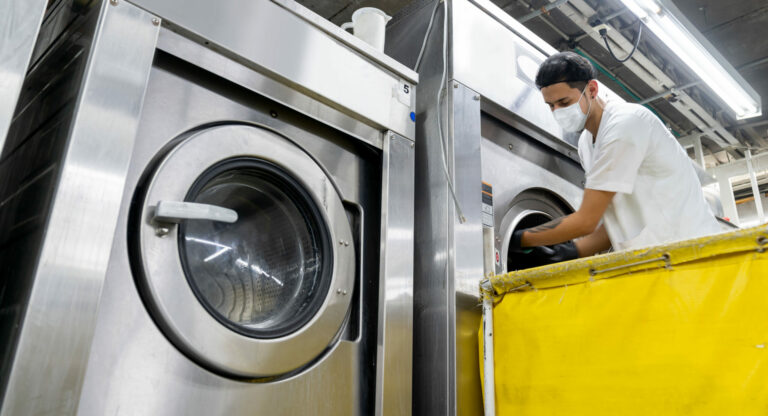
The survey will be followed up with a series of focus groups, user interviews and sessions with managers and policy writers.
The questionnaire covers the following topics:
• Existing infection controls with regards to laundry
• Current processing methods for bed, bathroom and personal clothing laundry
• Processing methods, procedures and management for soiled linen
• Attitudes towards existing infection controls policies associated with laundry
• Understanding of the barriers to care home settings implementing infection control policies
• Bed change policy
• Healthcare workers’ knowledge of infection control policies in care home settings
“The TSA and DMU have a very strong working relationship,” says Stevens. “This is the latest in a series of projects we have collaborated on. It will give us a new depth of understanding and should point the way to improving infection control in care homes.”
For more information on DMU visit dmu.ac.uk
If you have any queries, please do not hesitate to get in touch with us either via email or phone:
T +44 (0) 20 3151 5600
Offering a clean start to life after prison with the TSA
Re-launched scheme will aim to provide employment opportunities in the laundry industry
The Textile Services Association has begun the relaunch of its “Giving People a Second Chance” initiative. This aims to build relationships between the laundry industry and the prison service’s New Futures Network (NFN) to build skills and create job opportunities for ex-offenders.
The NFN brokers partnerships between employers and prisons, helping to identify the best ways for organisations to get involved with providing vital work experience for serving prisoners as well as building up numbers of viable employees. With the staff shortages currently facing the textile services industry, the TSA feels that this is a win-win situation for its members and for ex-offenders.
The laundry industry is ideally suited for involvement in these partnerships. Laundry services are a vital part of prison life and form one of the main methods of providing employment and training to serving prisoners. All laundry for prisons is carried out within prisons, and currently about 500 prisoners are employed in this activity across the UK.
The NFN and the prison service offer a number of ways for businesses to get involved. This varies from employing serving prisoners within production facilities in prisons, to employing risk-assessed inmates who have been Released On Temporary License (ROTL) on day release. And finally, helping to arrange interviews with serving offenders in the hopes of offering them full employment upon release.
Rebecca Morgan is the head of HR at Johnson Hotel Linen, a company that has worked with the TSA and the New Futures Network to spearhead this new scheme. She has seen first-hand the benefits to both staff and companies that this scheme can bring. “I went to an employment open day at a local prison, it completely changed my view on offenders and ex-offenders and what they can offer,” she says. “Those I spoke to were polite and engaged, and have turned out to be very reliable and motivated employees.”
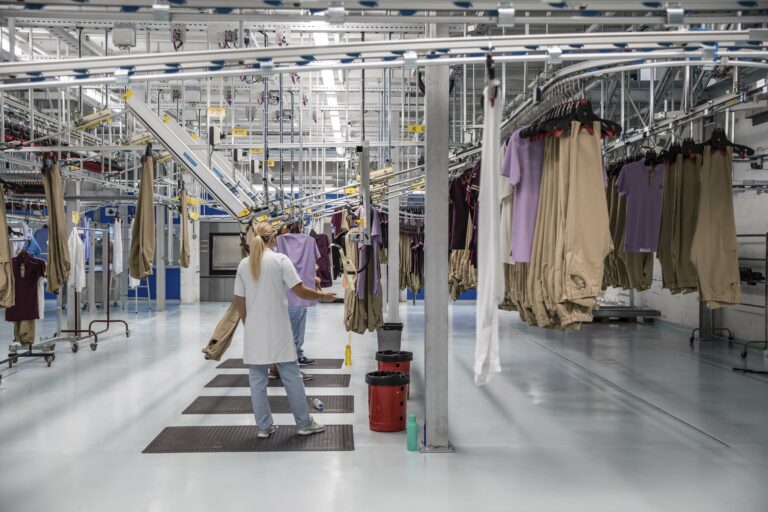
While some companies may be wary about employing ex-offenders, Rebecca is clear that it is no riskier than hiring anyone else. “Everyone on this scheme has been fully vetted, and are all looking for a second chance,” she explains. “A lot of the time they believe that there aren’t employers out there willing to give them that chance, but I’ve seen so many success stories come out of it I would recommend it to all laundry companies. It can change lives!” Research from NFN and the Ministry of Justice backs this perspective up, with over 90 percent of businesses that employ ex-offenders agreeing that they are good attenders, motivated, reliable, good at their job and trustworthy.
One of the biggest causes of reoffending is a lack of employment opportunities for ex-offenders. While prisoners can gain a range of qualifications and skills during their sentence, it can be difficult to find work on release, particularly if ex-offenders live in, or move to, a different part of the country from the prison they served in, and they no longer have the benefit of being near local companies that may have employed them on ROTL. Furthermore, the stigma surrounding ex-offenders can also affect job prospects, despite them regaining full employee rights at the end of their sentence.
The TSA hopes that its initiative will help to create opportunities to train potential future employees. It may also evolve into a national framework for laundries, allowing them to hire ex-offenders in parts of the country without laundry-based schemes operating from local prisons.
Jason Errington, head of operations for industries, in the prison service’s rehabilitation and care services group has been co-ordinating the laundry services with the NFN at a number of prisons and is equally enthusiastic about the potential for the scheme. “The people we get into employment generally stay in employment,” he says. “Schemes like this are an important part in reducing reoffending and are a great way to fill some of the staff shortages the laundry industry is facing.”
“Recruitment is a huge issue facing many industries across the country and it is certainly a challenge we are facing as well,” says Emma Andersson, director of finance and membership of the TSA. “We’re committed to do everything we can to help our members find the right employees. This initiative will help to do that while also offering a new start to so many people.”
The TSA is currently working with the prison service and its members to fine tune the scheme. The Association plans to host a webinar in the future to share useful information and best practice.
Any laundries interested in learning more about the initiative and the ways they can get involved, including visiting a local prison, should contact Emma Andersson at the TSA.
If you have any queries, please do not hesitate to get in touch with us either via email or phone:
T +44 (0) 20 3151 5600
Update from the TSA
“Save our commercial laundries” – The TSA asks new PM to guarantee support for vital industry sector
Rising energy prices for laundries could cause massive problems for whole UK economy
In an open letter to the new Prime Minister, the Textile Services Association (TSA) has called on Liz Truss to urgently consider immediate measures to help the commercial laundry industry as part of the emergency budget to deal with the crisis being caused by rising energy costs.
The commercial laundry sector plays a key role in the UK economy but one that was overlooked during the Covid-19 pandemic by the government and denied assistance because it falls between the definitions of various primary and secondary sectors.
The TSA recently surveyed its members asking them about the kind of changes in energy prices they are seeing. All responding companies reported significant increases, with rises of anything from 300% to 1500% being forecast over the coming months.
“Without laundries, sectors like hospitality, healthcare and many others wouldn’t be able to operate,” says David Stevens, CEO of the TSA. “At the start of the year, energy costs represented 10% of a commercial laundry’s overheads but we are looking at increases of several orders of magnitude of that.”
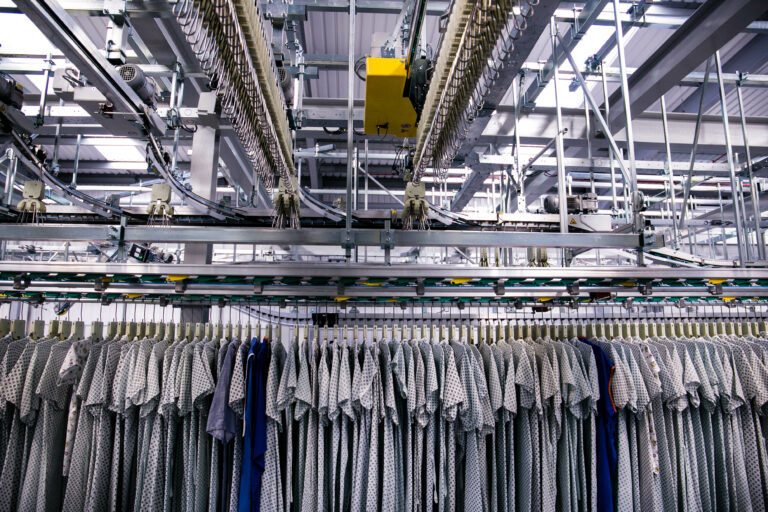
The TSA is concerned that without decisive action there is a risk of companies going out of business, which could have cascading effects as sectors that rely on laundry services are unable to access them. “The increased costs would have to be passed on to customers, and at that level it would generate inflationary pressures,” says Stevens. “Laundry tends to be a business that works behind the scenes, so most people don’t realise we’re there. Without laundry, hospitality would have to shut down within a day. The healthcare sector would last two days. The damage that would be caused by not supporting the laundry industry would be catastrophic for the UKPLC as a whole.”
The TSA is calling on the new government to put measures in place that supports the industry as it is an energy intensive user. The proposed measures include rate relief, low interest long term loans, qualification for grants previously denied the industry, along with subsidised energy costs and the introduction of an industrial energy cap.
“We are doing what we can to help our members reduce their costs, but with price increases this large it will make little actual difference,” says David. “We urge the new Prime Minister to take swift action to ensure that laundries aren’t forgotten during this crisis.”
If you have any queries, please do not hesitate to get in touch with us either via email or phone:
T +44 (0) 20 3151 5600


